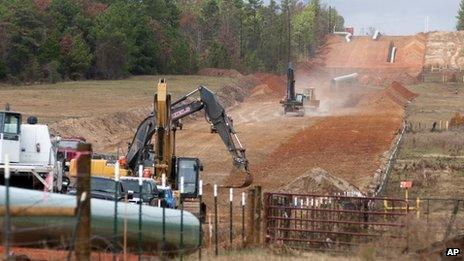US government delays Keystone XL pipeline decision
- Published

The US state department has given federal agencies more time to review the Keystone XL oil pipeline before it determines whether to issue a permit.
The delay suggests the decision whether to approve the pipeline could come after November's midterm elections.
The 875-mile (1,408km) pipeline would carry tar sands oil from Alberta, Canada, to the US state of Nebraska.
Environmentalists say the pipeline will lead to increased carbon emissions and contribute to global warming.
The state department's decision follows a recent ruling by a Nebraska judge overturning a state law that enabled the governor to approve the pipeline's path. The court decision sent the permit application back to state regulators.
'Shameful'
The US government has not yet said how much longer the review of the pipeline will take, but the state department raised no major environmental objections to the pipeline in a report released in February.
The state department is involved in the permitting decision because the pipeline would cross an international border.
The Keystone XL project aims to carry some 830,000 barrels of heavy crude a day from the fields in Alberta to Nebraska.
The oil would then be transported on existing pipes to refineries in Texas. The southern section of the project was finished last year.
Republicans have long supported the initiative, saying it will boost the US economy, create jobs, and reduce North America's dependence on foreign oil.
House Speaker John Boehner, a Republican, called the decision to delay the permit "shameful".
"This job-creating project has cleared every environmental hurdle and overwhelmingly passed the test of public opinion, yet it's been blocked for more than 2,000 days," he wrote in a statement.
- Published1 February 2014
- Published1 August 2013
- Published2 March 2013
- Published21 January 2013
- Published18 May 2012